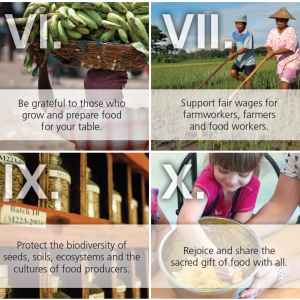Interview with Rev. Karen Hagen, pastor of Tippecanoe Presbyterian Church in Milwaukee, Wisconsin about their new Rooftop Garden
You’ve had a community garden going for a few years now, but tell us about this new initiative.
Our Rooftop Garden has been completed and is growing with harvest coming. Education around the gardens has included the Webinar, local newspaper, garden blessing, and upcoming canning and food use in Divine Intervention’s food programing. We are participating in our synod’s just.good.food program as well.
How did you do it?
Approximately 14 volunteers worked on the Rooftop Garden installation, approximately 20 are working in our other gardens and maintain Rooftop Garden. Primary responsibility for garden care falls upon our Garden Keepers who are homeless and formerly homeless Guests of our Divine Intervention Ministry. Already we have approximately 100 lbs. of organic produce given away. We have developed relationships with 4 funders, 2 restaurants interested in produce grown locally, and 1 local greenhouse that will help us look forward to next enhancements.
Anything surprising happen?
More volunteers than anticipated and a deepening relationship with our neighborhood! One of the unexpected challenges came in relying on one of our partners to coordinate different aspects of the installation of Rooftop Garden. As we move to next aspects of our gardens, we will be proactive in taking on this role ourselves.
Do you have any recommendations for others that may want to try something similar?
Partnerships are key not only in accomplishing but maintaining the gardens. Continually inviting new people to become involved is important to maintain support as key volunteers may need to limit or change their volunteerism with project. Think forward!
Has this project changed your church or community in any way?
Yes! It has allowed us to see what is possible as we stay faithful to our vision and think and partner creatively. And, quite unexpectedly, new attention from the greater community is coming toward Tippecanoe in support and visitors to worship.
Here is the newspaper article about the initiative:
Two Milwaukee churches growing food & jobs
Read more »
 Comments from Andrew Kang Bartlett, Presbyterian Hunger Program, at the Spirit of the Harvest Festival on October 20, 2016 in Sebastopol, CA, sponsored by the Interfaith Sustainable Food Collaborative “It’s an honor to be with you. And it’s great to be here in California where I lived for 13 years before moving to Louisville KY… Read more »
Comments from Andrew Kang Bartlett, Presbyterian Hunger Program, at the Spirit of the Harvest Festival on October 20, 2016 in Sebastopol, CA, sponsored by the Interfaith Sustainable Food Collaborative “It’s an honor to be with you. And it’s great to be here in California where I lived for 13 years before moving to Louisville KY… Read more »
 Comments from Andrew Kang Bartlett, Presbyterian Hunger Program, at the Spirit of the Harvest Festival on October 20, 2016 in Sebastopol, CA, sponsored by the Interfaith Sustainable Food Collaborative “It’s an honor to be with you. And it’s great to be here in California where I lived for 13 years before moving to Louisville KY… Read more »
Comments from Andrew Kang Bartlett, Presbyterian Hunger Program, at the Spirit of the Harvest Festival on October 20, 2016 in Sebastopol, CA, sponsored by the Interfaith Sustainable Food Collaborative “It’s an honor to be with you. And it’s great to be here in California where I lived for 13 years before moving to Louisville KY… Read more »
 Just in time for the global Food Week of Action! The Food Week of Action begins on Monday, October 10 and includes World Food Day on October 16. Our team has developed these 10 Commandments and Manoj Jurian, coordinator of the Food for Life Campaign, has created this tool for congregations, with brief theological reflections…
Just in time for the global Food Week of Action! The Food Week of Action begins on Monday, October 10 and includes World Food Day on October 16. Our team has developed these 10 Commandments and Manoj Jurian, coordinator of the Food for Life Campaign, has created this tool for congregations, with brief theological reflections… 
 A big thank you to Adam Liebowitz at North Star Fund, a fellow member of the Sustainable Agriculture and Food Systems Funders, for this great collection of news on all things food and farming.
A big thank you to Adam Liebowitz at North Star Fund, a fellow member of the Sustainable Agriculture and Food Systems Funders, for this great collection of news on all things food and farming. Intern Profile | Kaley Necessary
Intern Profile | Kaley Necessary Intern Profile | Esther Honegger
Intern Profile | Esther Honegger
 “Most of them wore them to school on Monday!”
“Most of them wore them to school on Monday!”

